Over the past few years, we have seen the micro:bit grow into one of the most useful programming tools in the classroom. Here at SparkFun, we even developed and released a whole ecosystem of carrier boards and kits for it. The micro:bit became our top selling educational platform within a year of its release. Since then, it has been a steady rock for STEAM education in a time of uncertainty while most students participate in school at home. The micro:bit has been easy to program, easy to administer and affordable enough to send home with students.
All of that being said, this week marks an exciting moment for the micro:bit. The announcement of micro:bit v2! You heard me correctly, micro:bit v2! Announced late Monday / early Tuesday most of us are waking up to the news with curiosity on our minds. Well, here is a sneak peek from us as to what is new on the micro:bit v2 for you to look forward to.
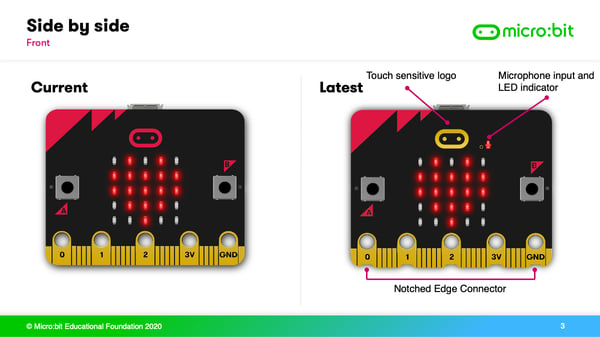
Front
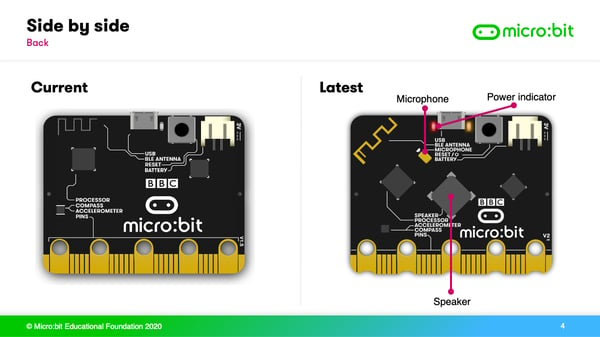
Back
Before jumping into the new additions, we wanted to share a quick comparison table with all of you table nerds out there.
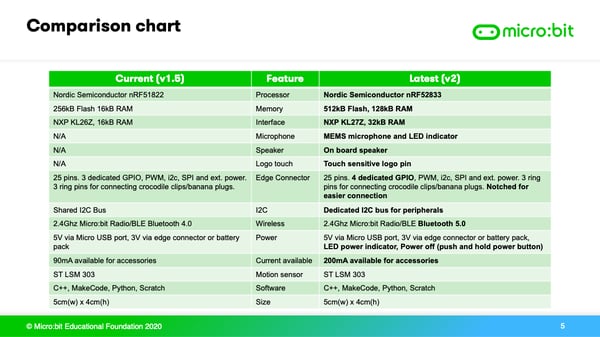
A New Brain
Not that the older version of the micro:bit was a scarecrow by any means. It was pretty hefty in terms of computing power, but there were some users, specifically those looking to get the most out of Bluetooth, who were pushing the micro:bit to the limits.
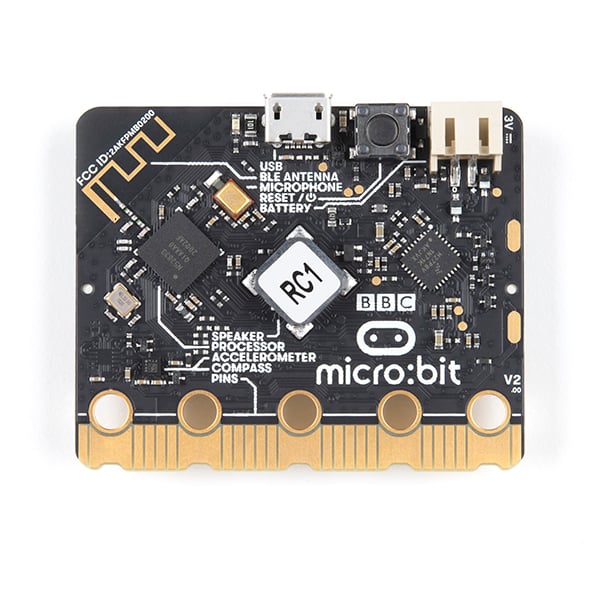
The micro:bit v2 sports a new Nordic nRF52833 and doubles the amount of flash memory on the board. This updates a number of features, speed and power consumption on the micro:bit. But, one thing it does that we are looking forward to is it opens the doors to starting to incorporate Artificial Intelligence (AI) and Machine Learning (ML) into your micro:bit projects. It should be noted that this is just us speculating and there is nothing to point at in terms of the micro:bit Foundation and its partners rolling out AI / ML out of the gates, but it does have potential in the future. We will keep an eye on this prospect. We for one are excited to start dabbling in this area!
Marco… Polo!
Since the release of the original micro:bit, students have always been able to have fun programming the micro:bit to play music and sounds. Usually through hacking their own headphones or, if the teacher was brave enough to stand the audio bombardment of a classroom full of “music,” an external speaker. This was always a bit of a letdown for those getting into micro:bit as it was something they had to add on to the hardware.
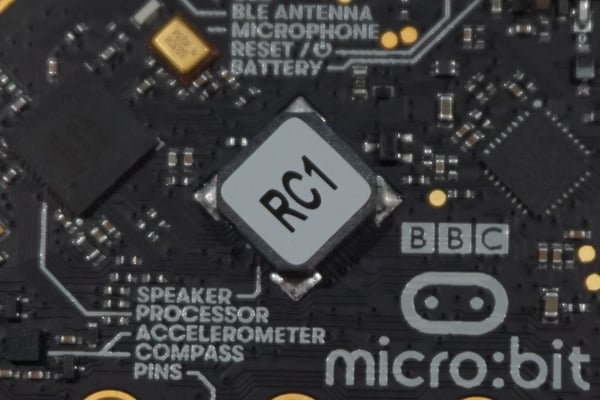
Which is why we’re glad to see that the micro:bit v2 has a built in speaker. The speaker is on the back of the micro:bit v2 and, I can tell you from experience it is as loud and annoying as the external speakers that we include in our kits. Now, your students can make a noise machine, set up a burglar alarm or build a musical instrument using just the micro:bit itself. Oh, joy!
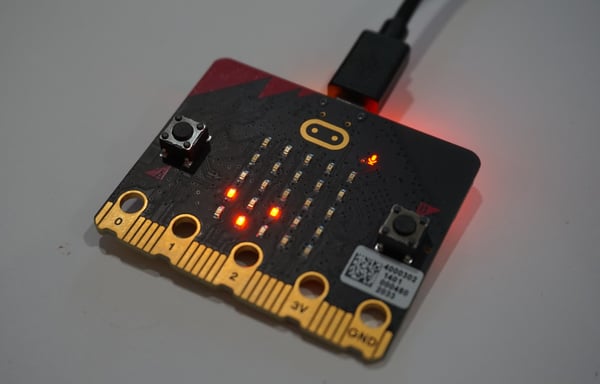
Along the lines of sound, the micro:bit v2 also has a microphone added to it. This was a wonderful addition to the on-board sensor suite of the board. At first I was rather skeptical about the quality of the microphone and how clean its inputs would be… too sensitive or not sensitive enough.However, I was wonderfully surprised by how responsive the microphone was and, at least when combined with the bar graph functionality on the LED array as a graphical output, how consistent and clean the signal was. Between the microphone and the speaker this opens up a whole possibility of new projects with just the micro:bit alone!
Don’t Touch This
The micro:bit Foundation added one more sensor to the board: a capacitive touch sensor. If you have used the micro:bit before, you may have used the touch functionality on the pins of its edge connector. This was great, but at times was a little tough to use with the pins being jammed together. The micro:bit v2 has moved the touch functionality and connected it to the micro:bit logo at the top of the board.
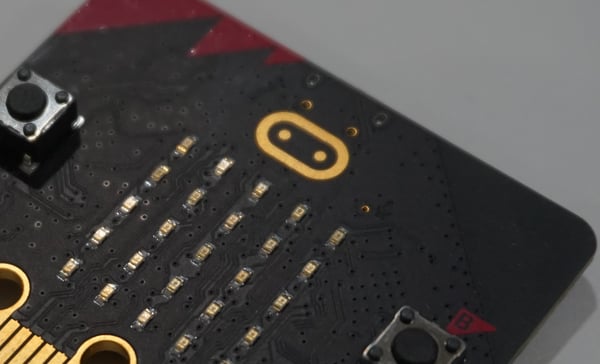
Comparing it to a previous version, you can see that the logo is no longer part of the silk screen, but actually metal. Another wonderfully simple input for this little board.
Communication Overload!
While not the most flashy collection of updates to the board for most people, for those looking to push the limits of the micro:bit, v2 features BLE 5.0. This change opens up a number of potential avenues in terms of communication with other devices such as phones, laptops, etc.
At SparkFun, we also like the change to a dedicated I2C port as many of our accessories such as the moto:bit and weather:bit communicate with the micro:bit via I2C. This means a more stable and consistent user experience.
The Edge
Another update to the micro:bit v2 that you may have noticed are the small “bites” taken out of the edge connector.
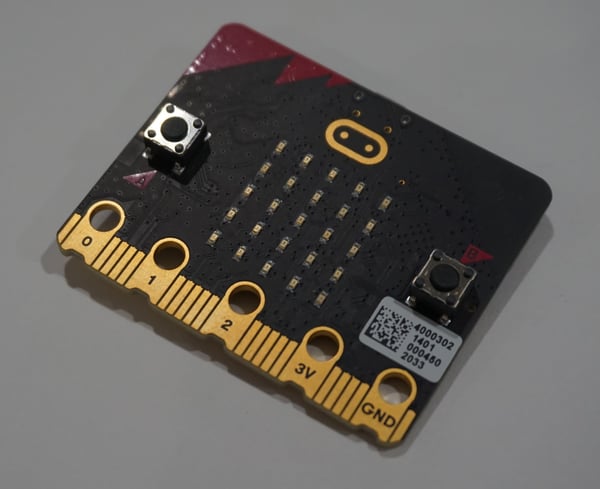
These “bite” are there to make it easier to connect external components to the micro:bit with alligator clips without sliding around, falling off or shorting on other pins. I can tell you from personal experience, this small and seemingly simple modification is a big deal and improves prototyping greatly.
POWER!
Last but not least, the additions of a few updates around powering the micro:bit and its output. The micro:bit v2 includes a way to turn it on/off from the board. Those of you that have burned through batteries when students leave the battery packs plugged in know why I am excited about this!
Another, a great update for those of you that do a lot of tinkering with external components and the micro:bit is that the total output current through the micro:bit v2 has been bumped from 90mA to 200mA. This is great for driving more than one or two LEDs before things start to go dim. There are also a few improvements for the power inputs as well, but I will wait to test those in more depth until I have more than one on my desk. (I don't want to release the magic smoke from my only board!)
Looking Forward
When we thought that the micro:bit was rock solid, the Foundation went ahead and improved it with this version v2. After reviewing the board and being hands on with it. I can tell you that the Foundation put a lot of thought into the updates. They listened to feedback; both from teachers and students, but also from partners.
We are told that the micro:bit v2 will start shipping sometime around mid to late November 2020 with limited availability. Until then, we are offering the micro:bit v2 Board, the micro:bit v2 Go Bundle, and the micro:bit v2 Club Kit, all for pre-order today. Placing your order will reserve stock in the order that it is received. So, the sooner you place your order, the sooner you'll get your desired micro:bit v2 product!
Between now and when we expect micro:bit v2 to start shipping, we also are updating our current ecosystem to support the v2 release with the SIK for micro:bit v2, SIK Labpack for micro:bit v2, and the micro:bit v2 Educator Lab Pack. All three of these kits are available for pre-order and the photos may not be final, hence they are subject to change. Don't worry, all of our previous micro:bit Kits will remain available for at least the next year.
We will be testing out our existing micro:bit ecosystem of carrier boards to make sure that everything works and is as compatible as we can make it. We may even sneak some new content in there for those of you that are early adopters of the v2. Keep an eye out for updates from us on our social media channels, newsletter and video releases.



announcement, micro:bit